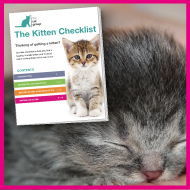Cat Group launches kitten checklist for owners

The Kitten Checklist has been developed to help potential owners find a happy, healthy kitten.
A new checklist to help prospective owners when adopting or buying a kitten has been launched by The Cat Group.
The Kitten Checklist has been developed to help potential owners find a happy, healthy kitten, and to avoid the heartache and potential costs of taking on a sick kitten, or one that is scared of people.
It covers how to identify signs of ill health, how to understand the kitten’s behaviour and how to determine how comfortable it is around people.
Cat behaviourist and author Vicky Halls said: “Many people don’t understand that in order to become a good pet cat, kittens need positive interactions with people and need to get used to the human environment and lifestyle before they are about eight weeks old. This responsibility lies with the person who has bred the cat (either accidentally or purposefully) because these important things happen before the new owner even gets the kitten.
“Being happy around people is something which has to be developed in a kitten and will not happen naturally if that positive interaction between people and the kitten has not occurred at the right time. If this opportunity is missed, kittens may be fearful or nervous and never become confident interactive pets.”
The Cat Group is a collection of 20 professional organisations dedicated to feline welfare through the development and promotion of policies and recommendations on the care and keeping of all cats. Its members include International Cat Care, the BSAVA, the BVA and the All-Party Parliamentary Group on Cats.
The group meets to consider current issues relating to cats with the aim of providing high quality information and advice gained from scientific and welfare sources.
Steve Reed, vice chair of the All-Party Parliamentary Group on Cats advised: “Understanding what you want from a cat and what can be expected of that cat, can help to avoid the stress (for you and the kitten), heartache and potential expenses caused by illness or inherited problems in some pedigree kittens.
“Every kitten looks cute and people often take on kittens because they feel sorry for them, or just don’t want to say no to the seller. Under new legislation, a kitten must not be homed until it is 8 weeks old.”



 The latest
The latest